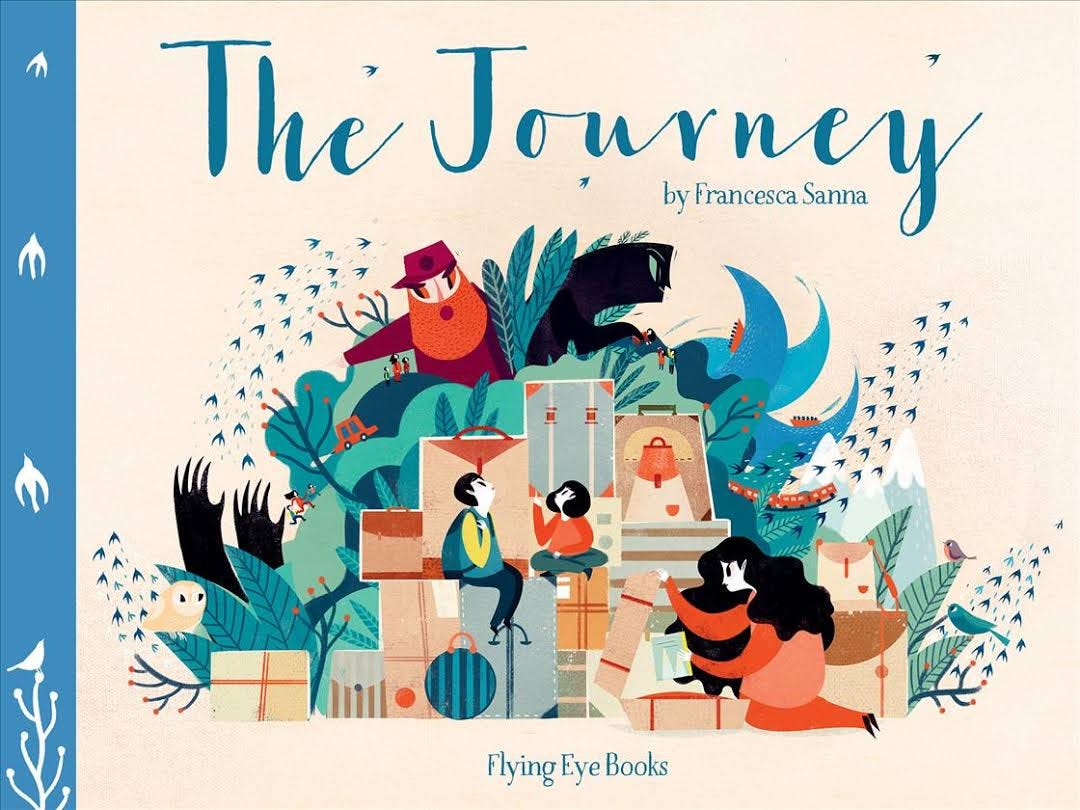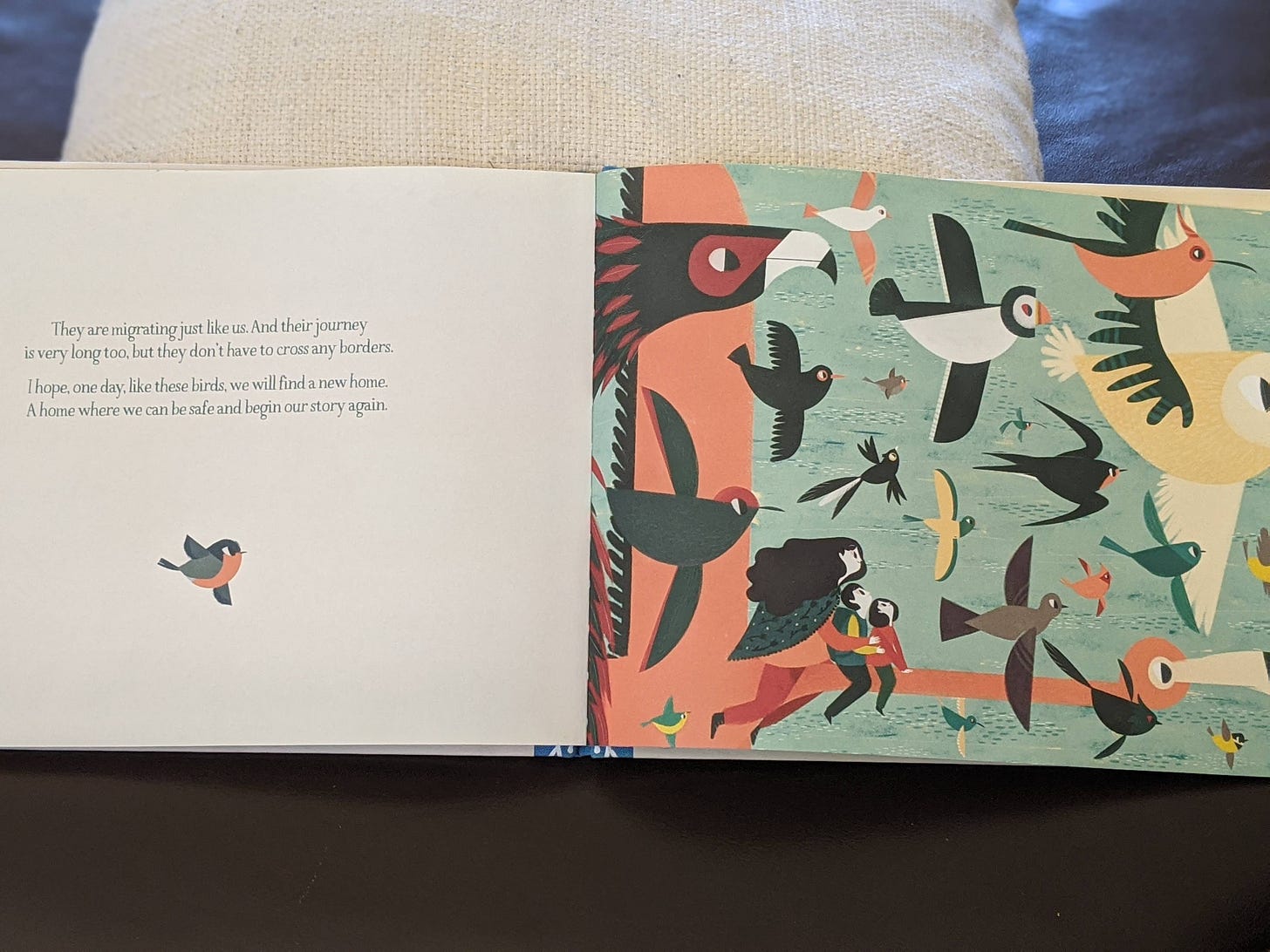On Where to Start
So many of us are feeling charged yet paralyzed. Where do we start?
“By not running from books that pain us, we can allow them to transform us. I ran from anti-racist books most of my life, but now I can’t stop running after them, scrutinizing myself and my society, and in the process changing both.” – Dr. Ibram X. Kendi, author of “How to be an Antiracist”

Yesterday, Lola picked up “The Journey” by Francesca Sanna before naptime. “Read this to me, Mama.” My heart sank a little, wondering how to navigate this text with her, in the midst of all the other conversations we’ve been having. While I had read this book numerous times to her as a three and four year old, her questions as an almost-six-year old often left me wondering alongside her.
In The Journey, Francesca Sanna tells the poignant and powerful story of a refugee family who flees their home in search of a safer place to live. Told from the perspective of a little girl who has just lost her father to war, you’re swept along on her journey feeling sadness, fear, and deep hope for this little girl and her family.
“There’s a wall, Mommy. Just like the one Donald Trump is making.” - Lola (5.5)
“Scary! He says GO BACK!” “She’s sad. Mama’s crying.” – Joaquin (2.5)
“The mom can feel brave and scared at the same time.” Lola (5.5)

Every time I pick up a book like this, I’m filled with gratitude for these magical authors who let me into this new world to experience empathy and connection with people I know, circumstances I have read about, or experiences I can never fully understand. They gave me a window into a world or perspective I didn’t yet know. Books have that magic – of acting as windows, mirrors, and sliding glass doors. Mirrors reflect back our own experience within the larger human experience. A gift so critically important for our Black and Brown children living in a White-dominant culture. And sliding glass doors provide an opportunity to engage and perhaps change your perspective so you may behave differently next time.
When we choose books that offer windows, mirrors, and sliding glass doors, we teach:
Vulnerability in sharing our emotions: The themes in these stories are often painful, or at the very least leave us adults with a lot of emotions. My kids have seen me cry in response to a story. When we can show our own feelings and the things we care about, we show our children they are safe to do so as well. They offer conversations about a range and complexity of emotions – that the little girl was probably feeling sad, scared, and hopeful about leaving her war torn home. We can feel many emotions at once. That the mother was feeling terrified and brave at the same time – grownups get scared, too.
Vulnerability in not knowing all the answers: None of us have all the answers. If we did, we wouldn’t still be trying to dismantle systemic racism and hundreds of years of oppression. Choosing these books and being willing to have the conversations teaches our children how to have courageous conversations. It teaches our children to talk about race, a behavior many of us adults are still trying to figure out. When we are brave enough to engage in the conversation and acknowledge when we don’t know, when we are still searching, and when we are struggling, it teaches our children to search, to struggle, and to be unafraid to say they don’t know.
Like so many of you, I have wondered where to start as a response to my own awakening. Awakening again, and again, and again. With every new post or article I read, I realize how much I have to learn and unlearn, and how much work there is to be done. But these books offer a starting point to have conversations – new conversations with ourselves and our family members, and sometimes the same conversation – all towards progress. Progress that will look different for all of us, depending on where we are on our journey toward uprooting injustices, unlearning beliefs we’ve adopted as part of our culture, and actions that perpetuate racism when we fall short of anti-racism.
So where do you start? Start by picking a few books that look interesting to you. Read them and stay open. What might be coming up for you might not be what your child reacts to at all.
My kids ask different questions every time they pick up a book, even if they’ve read it 45 times before. And sometimes they ask the same question again and again, reminding me that I can’t explain a topic like racism in one conversation. They are still wondering, just like I am “why do they not like Brown people?” They remind me how complex it is to understand these themes, and how complex our solution will need to be in combating it. Have grace with yourself when you don’t know and let’s get started.
Let’s be In Dialogue!
Share your thoughts/comments below. I would LOVE to hear from you! What does this make you think about?
Share your thoughts/comments with a friend/family member!
Share this post with others so you can be in dialogue!

Ah yes, I remember this story well. I was in the classroom when this book first came into the school, and I'm always surprised by what the children make of it with each reading and among different classrooms. What is common is that universal question about the existence of a wall and the unfair treatment of Brown families.